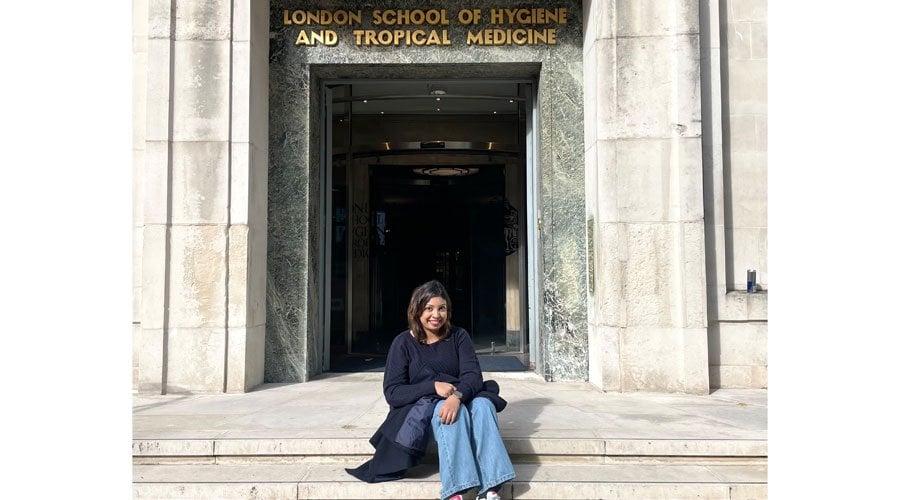Study UK Alumni Award winner – Dr Kamrun Koly
22 February 2024 London School of Hygiene & Tropical Medicine London School of Hygiene & Tropical Medicine https://lshtm.ac.uk/themes/custom/lshtm/images/lshtm-logo-black.png
Dr Kamrun Koly (MSc Global Mental Health, 2019) has won the Study UK Alumni Award in the Science and Sustainability category in Bangladesh. Within four years in her role as an Associate Scientist at iccdr,b, she has implemented 10 noble research projects focused on marginalised populations. She spoke to us about her current work, her memories of LSHTM, and her plans for the future.
Can you please tell us a bit about your current work/research?
My current focus of research is people with dementia, mental health and gender-based violence among internal migrants in Bangladesh. Also, I am pursuing my PhD at the University of Essex, for researching to co-design a right based and mental health approach to support the people with neglected tropical diseases in Bangladesh.
Why did you choose to study with LSHTM?
The Mental Health (MH) sector of Bangladesh has been one of the most neglected sectors with low evidence, a dearth of human resources, and a lack of adequate service facilities. While working directly with different vulnerable communities from 2013 to 2017, I felt the need for advanced educational training to equip myself with the knowledge to conduct more timely mental health-related research and design appropriate programmes for Bangladesh. As expected, there were no postgraduate courses available for studying mental health, so there are no scientists in this field as well. However, I became fascinated with the works of Professor Vikram Patel, one of the top scientists in Global Mental Health, especially, and his TED talk inspired me to keep pursuing my career endeavour in this most stigmatized and underrated sector (back then), especially in low-income countries like Bangladesh. Vikram Patel was one of the founders of the Centre of Global Mental Health (CGMH) at the LSHTM where he taught about different methods, programmes, and approaches to make mental health services more inclusive, accessible, and available, especially for the resource constraint countries. Therefore, I wanted to attend this MSc. In Global Mental Health to learn these approaches and come back to Bangladesh to translate those into action.
How does it feel to have been selected as the winner for this year's Alumni Awards in Bangladesh?
Ever since I have come back from the UK, I have been a biggest cheerleader of the quality of the education, that I have received from LSHTM. Science is not a fancy job, particularly not often for the women from a conservative society like Bangladesh. Therefore, winning this award in Science and Sustainability, would be a great recognition and motivation for me to work harder. I hope this will also inspire the next generation women to work in STEM and also study in the UK.
Did you have to overcome any challenges to study with us?
Initially, I had difficult time to manage the course in two schools as the UK academic system was different than that of Bangladesh. But eventually, with the help of the generous academics and my wonderful classmates, I blended with the system of LSHTM.
What were your favourite memories from your studies with us?
I have so many memories from that one year- I met Prof Vikram Patel at 2018 when he came for a conference, I went to see my first ever Christmas lights on the Covent garden with my class mates. Also sitting at the refractory in the break and discussing different ideas with my class mates was also very special to me.
How has your LSHTM degree helped you in your career?
The top-notch academic training, research supervision, and like-minded networks of LSHTM groomed me to get more acquainted with advanced mental health research methodologies. Additionally, CGMH of LSHTM has many mental health professors and scientists, with whom I am still interacting and was privileged to establish collaborations. Upon returning, I continued the collaborations by obtaining research grants and publishing at least 5 scientific papers with the professors from LSHTM. In my class, there were other mental health enthusiasts coming from 27 countries such as from Kenya, Nigeria, South Africa, India. Exchanging ideas and dialogues among ourselves, about new methods of Mental health research; also helped me to achieve my learning agenda. As a matter of fact, for my PhD I am partnering with one of the biggest charity organisation Lepra UK, to develop a mental health and human rights-based support programme for the people with neglected tropical diseases in the northern part of Bangladesh. Lepra UK has intentions to scale this programme to their other operational sites if proven to be successful… In summary, I would have never gotten the same professional exposure from anywhere else other than the finest academic curriculum and the rich expertise of professors in mental health research in LSHTM.
What would you like to achieve in future?
Continuing my work to devise timely initiative to support the mental health needs for the people in need in Bangladesh and beyond.
Do you have any advice for students/recent graduates?
You all are stars, you just have to stay passionate to shine the brightest.